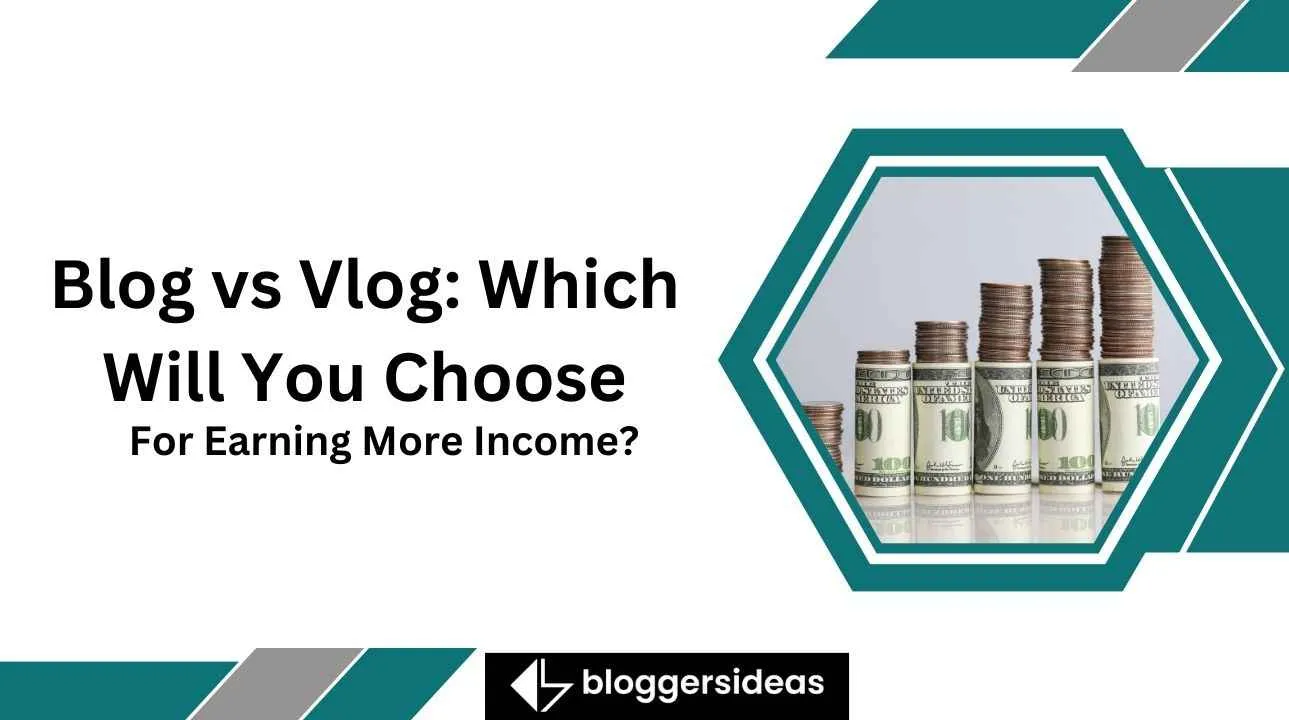Which one, a blog or a vlog, is more worthwhile and why?
Choosing the RIGHT platform is critical if you want to generate money online or establish your business.
Blogging and vlogging each have advantages and disadvantages to consider. Additionally, both of these methods can assist you in generating income online.
This post will help you decide between blogging and vlogging if you’re still undecided. So, are you all set to learn more? Let’s get this article started!

Blog vs. Vlog: Which Will Be the Most Successful in 2025?
| Feature | Blog | Vlog |
|---|---|---|
| Medium | Textual content with images, GIFs, and links. | Video content. |
| Content Creation | Writing skills, SEO, and CMS knowledge. | Video recording, editing, and platform algorithms. |
| Engagement | Comments, shares, and links. | Likes, shares, comments, and subscriptions. |
| Content Lifespan | Longer lifespan for evergreen content via SEO. | Varies; some have long-term relevance. |
| Monetization | Ads, affiliate marketing, sponsored content, digital products, memberships. | Platform ads, sponsorships, affiliate links, merchandise, memberships. |
| Technical Requirements | Lower; requires domain, hosting, and SEO tools. | Higher; needs quality recording and editing equipment. |
| Audience Development | SEO, social media, email marketing, guest blogging. | Platform algorithm, social media, collaborations, community engagement. |
Overview: Blog

You might be wondering, what exactly is a blog?
Online journals or informational websites such as blogs (sometimes known as “weblogs”) feature articles and pages where users express their thoughts on a variety of topics.
In order to create a brand, increase traffic, and increase revenue online, blogs are typically operated by a single person or a small team. Some blogs are formed just for the purpose of expressing one’s opinions on unrelated topics for the sake of entertainment.
Blogger, the most popular blogging platform at the time, was created in 1999 and eventually acquired by Google in 2003. Similarly, WordPress was founded in 2003 and has since grown to become the world’s most popular CMS.
Overview: Vlog

What exactly is a vlog, then?
A video blog, or vlog, is a blog that primarily contains video material. A vlog post includes videos, text, and metadata, such as titles and meta descriptions.
In 2005, vlogging’s popularity soared thanks to YouTube, the world’s most popular video-sharing site, which was also created that year.
How To Start a Blog vs How To Start a Vlog?
Steps To Start Blogging
You can also use free blogging services like Blogger, Typepad, and others to start a blog without spending any money.
If you want to start a new blog, we recommend the WordPress.org platform. It allows you to build a self-hosted WordPress blog over which you have total control (unlike free blogging platforms).
WordPress is the world’s most popular CMS, with a 61% share of the CMS market.
It also comes with tons of plugins and themes to help you build your website from scratch. So, if you’re interested in learning how to start a WordPress blog, here’s a step-by-step guide.
Step 1: Register your desired domain name. To create a WordPress site, you’ll need a domain name and web hosting. If you’re just getting started, I recommend Bluehost. With every new registration, you’ll get a free domain name!
More than 2 million websites use Bluehost, which is explicitly recommended by WordPress itself.

Step 2: Go to the Bluehost page and pick a hosting plan that fits your needs and your budget. We suggest the “Choice Plus” plan, which costs $5.45 per month and allows you to host an unlimited number of websites.
Step 3: It’s time to create a new domain in Step 3. (domain registration is free for the first year). For those who already have their own domain, feel free to use it. Alternatively, you can put off creating a domain for now and do it later.
Step 4: In order to proceed to the next step, you’ll have to register an account first. You can also create a Bluehost account quickly by logging in with your Gmail address. Check the details of your hosting bundle and complete your payment after it’s finished.
Once you’ve done this, you’ll receive an email from Bluehost with instructions on how to install WordPress on your site’s root directory or a subfolder using the Marketplace or My Sites options.
Steps To Start Vlogging

The nicest thing about Vlogging is that it is free. Yes, all you need to begin a vlog is a YouTube channel linked to your Gmail address.
If you don’t already have one, sign up for Gmail today. It’s free. Step-by-step instructions for starting a YouTube vlog are provided here.
Step 1: Begin creating your YouTube vlogging channel. Alternatively, you may use your Gmail login credentials to access your YouTube channel settings by signing in.
Step 2: To add or manage your YouTube channels, go to the “Add or manage your channels” page by clicking on the “Settings” button.
To move on to the next stage, simply click on it.
Step 3: Click “Create a New channel” to proceed to this Step. You’ll have to set up a Brand Account.
It doesn’t have to be the same name you used to sign up for a Google account, either.
As a brief note, we HIGHLY recommend you create a brand account that reflects your blog, website, app, or online company.
Step 4: You may be asked to authenticate your account via text message or voice call after clicking the “Create” button in this Step. If this is the case, simply enter the code you received from the option you selected.
You’re done with the Brand Account verification process when you’re done. You’ve successfully started a YouTube vlog and have been redirected to your channel’s dashboard.

How to Make Money with Blog vs Vlog?
How to Make Money with Vlogging?
Just like with blogging, there are numerous ways to monetize a vlogging business model. Yes, you may earn money from your YouTube channel by using Google AdSense, but that isn’t the only way.
So, let’s limit our discussion to the BEST methods for making money from your video material.
Sponsorships or Collaborations with Brands:
Working with other brands is a great method to monetize your YouTube channel. For good discounts with other brands, you’ll need a larger following (at least 100,000 members).
In addition to brand collaborations, you can also consider sponsorships, where most small channels receive free products in exchange for advertising.
It’s easy to get paid sponsorships if your channel has more than 100k subscribers. Sponsors can then pay you directly to promote their items in your videos, either by mentioning them or by giving reviews of them.
Make Money Through Super Chat:
YouTube introduced Super Chat in 2017 as a way to let creators sell their videos when they go live. It has proven to be a fruitful venture. Viewers can pay to have a comment pinned on a live stream using this service.
Viewers of your YouTube videos can pay to pin a conversation message with the Superchat feature.
Superchat remains visible for a limited time even as the conversation continues, and most messages are scrolled out of sight (depending on how much your viewers pay you).
When using US money, you must spend at least $5 for a one-minute message and up to $500 for a five-hour message.
In addition, YouTube’s “Channel Memberships” feature lets creators charge subscribers a monthly subscription for access to their original videos.
If you have a large enough subscriber base, you can make a lot of money from your video content.
Sell Affiliate or Information Products:
Finally, you can advertise relevant affiliate items in your niche by selling their affiliate or information products.
Use your favorite products as inspiration for video tutorials or how-to reviews on your channel. You can also sell information products like eBooks, membership subscriptions, and so on.
If you want to make a lot of money from YouTube vlogging, you need to have a large audience (at least 100K subscribers), post high-quality videos frequently, and be consistent.

FAQs
🤔 What is the main difference between a blog and a vlog?
A blog is based on written content accompanied by images or GIFs, while a vlog is centered around video content.
💻 Do I need technical skills for blogging or vlogging?
Yes, both require technical skills: blogging involves writing, SEO, and using a content management system, whereas vlogging requires knowledge of video recording, editing, and understanding video platform algorithms.
📈 Which is better for audience engagement, blogs or vlogs?
Both can be effective for engagement. Blogs engage through comments and shares, while vlogs use likes, comments, subscriptions, and shares. The choice depends on the type of interaction you prefer.
🕒 Do blogs or vlogs have a longer content lifespan?
Blogs often have a longer content lifespan due to SEO, making evergreen content continually discoverable. Vlog content lifespan varies, with some videos remaining relevant for a long time.
💰 How do blogs and vlogs make money?
Blogs make money through ads, affiliate marketing, sponsored content, selling digital products, and memberships. Vlogs earn through platform ads, sponsorships, affiliate links, selling merchandise, and memberships.
🎥 What equipment do I need to start a blog vs. a vlog?
For blogging, you'll need a computer and access to a blogging platform. Vlogging requires a higher investment in equipment, like quality cameras, microphones, lighting, and editing software.
📚 Can I switch from blogging to vlogging or do both?
Yes, many content creators manage both a blog and a vlog. Doing both allows you to reach a wider audience and cater to different content consumption preferences.
Quick Links
- The Cost of Starting a Self-Hosted WordPress Blog
- How To Start Vlogging And Make Money?
- How to Start Successful Vlog With Best Vlogging Tools?
- Monthly Content Planning: Optimize Your Blog Production!
Blog vs. Vlog: Final Thoughts
Whether you’re blogging or vlogging, both are effective methods for creating online content. So, which one or both should you choose? It’s entirely up to you, really.
Starting a vlog is a certain way to gain exposure and recognition. However, starting a blog is a good idea if your goal is to earn money online passively, enhance your writing skills, and attract highly targeted visitors.
Consider starting a YouTube channel if you already have a blog to expand your reach. As with vlogging, diversifying your traffic and income can be as simple as starting your own site while still maintaining your current vlog.
So, blogging or vlogging is your choice. Let us know what you think by leaving a comment below.







I really love to make videos. and I want to start vloging. Thank you provide us these information.